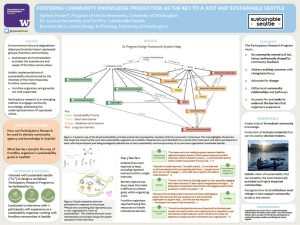Fostering Community Knowledge Production as the Key to a Just and Sustainable Seattle
Environmental urban development has been driven by the interests of middle and upper class white citizens, and has subsequently excluded the knowledge and needs of frontline and fenceline communities. Creating a space for knowledge production that centers the interests of these underrepresented frontline communities through Participatory Research can challenge the barriers that communities face when pursuing local changes. The aim of this study was to identify the barriers that frontline organizers, and organizers who work with frontline communities, face in their sustainability work and how these barriers may be dismantled through community owned knowledge practice in the form of Sustainable Seattle’s Participatory Research Program. Sustainable Seattle (S2) is an environmental nonprofit that focuses on uniting a shared vision of an equitable and just transition into a sustainable society. As an intern with S2, I developed a framework for their Participatory Research Program by researching the knowledge production processes in literature and interviews that would support communal ties around shared visions of change. From this work, I found that the barriers organizers face are interconnected and rooted in structural faults within our social and bureaucratic institutions. I also identified a need for a divergence from traditional written communications and academic ways of producing knowledge in order to foster inclusive community ownership of the knowledge process. By developing spaces in which frontline communities can act upon their own needs, society as a whole can implement sustainability investments that actively seek to break cycles of oppression and create a justly sustainable Seattle.
